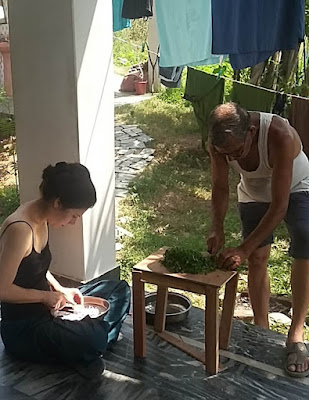I joined Educare India in may 2016, for 3 months. After finishing my studies in waste engineering, I planned to work with this NGO on waste management.
The adventure started in Naddi. Hopefully, someone was already working on waste management. That helped me to have a quick Induction. Thanks to that, we directly did activities related to SWASH :
- School workshop: we went to the governmental school in Cheni to do some workshops on waste. We played some games to raise their awareness. Each time, the workshop was a success and the kids were really engaged and involved.
 |
| Workshops in Cheni's Primary School |
- Trash collection: Once a week, we organized a waste picking for Naddi's shopkeepers. This project, established by previous interns, ran for a long time. We took over the project. That consists in collecting the waste bin from each shopkeeper involved , carrying it with a truck and empty the bins in a bigger waste bin that will be collected by the municipality.
 |
| Bins used to collect the waste |
This part is not the easiest or the cleanest but sometimes it is funny. One time we arrived at the big bin but we were not able to do anything because of the monkey family who had lunch around the bin. We waited, in the truck, in front of the bin, that monkeys finished their lunch.
Despite this fast Induction, it was very difficult to focus. There is too much to do ! You would like to do everything, but 3 months are not enough, you need to focus if you want to get things done. So you list the ideas and organize it with a priority level. After speaking with the organisation, we agreed to focus on the soft plastic issue. This waste is produced a lot and its collection and treatment are often neglected. The aim is to collect soft plastic from our house and one shopkeeper (start little but think big), clean it well and store it in hygienic conditions. The next step is to find a way to resell, reuse or recycle it.
After collecting the soft plastic, we built a washing machine that could clean more soft plastic and faster.
 |
| Our DIY soft plastic washing machine! |
The biggest part was to find the best "process" to clean the soft plastic efficiently and ecofriendly. That's mean using less water, a natural soap...
After we need to store it, waiting for something to do with the soft plastic. Some centers store the soft plastic in a cloth to create a cushion. I chose to store it in plastic bottles because it is costless and it is a way to reuse plastic bottles. if we don't find a solution rapidly to reuse this soft plastic, we can put the plastic bottles together and create a sofa!
 |
| Plastic bottle filled with soft plastic and sofa model |
Sofa, cushions or other products from soft plastic could be resell. If it is working, the project could be take over by the community because they could create money with this waste. Here is an idea to develop a local soft plastic recycling sector !
Working with Educare India made me think differently about the waste issue, with new problems and new perspectives that I had never think about before. I am happy to come back to my country with a new vision of the waste issue, it could be useful for my future job!
Coralie Rambaud - France
SWASH Project Manager in Naddi







































